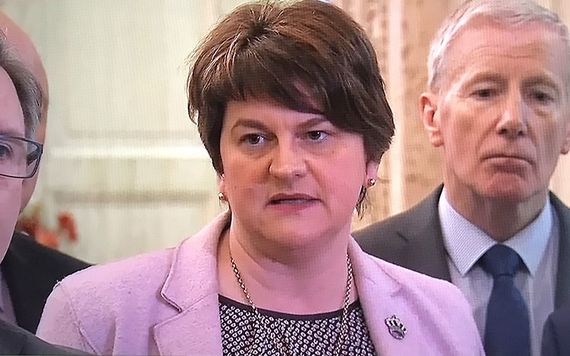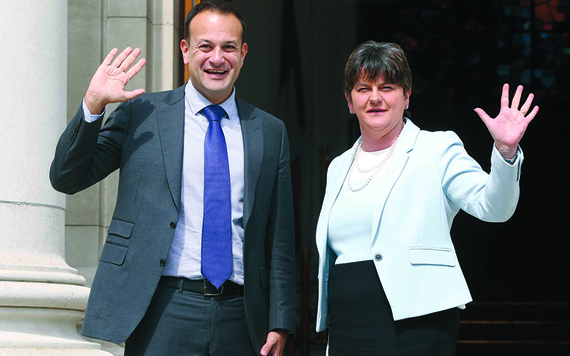Last week Arlene Foster, the North's First Minister, appeared in a new BBC documentary to discuss her personal history and the current state of politics in the North.
Foster was being interviewed by the broadcaster and comedian Patrick Kielty, who was exploring the 20 anniversary of the Good Friday Agreement and asking where next?
But when Kielty asked Foster what she'd do in the event of a vote in favor of a united Ireland her answer made headlines: “If the majority did want to join the Republic of Ireland how would it feel to be a Unionist, outside of the UK?”
“First of all I don’t think it’s going to happen,” Foster said. “If it were to happen, I’m not sure that I would be able to continue to live here, I would feel so strongly about it. I would probably have to move.”

DUP leader Arlene Foster at Stormont.
Her remark received a lot of attention in the press, but it really should have received much more. As First Minister, entrusted with leadership of all the people of the North, Foster's comments make the idea of a shared future look remote, if not completely unobtainable.
If Ireland is ever re-unified she would no longer be able to live on the island she stated. All bets would be off. If nationalists ever achieve their own longstanding political aim of reunification she would have no option but to remove herself. It was an extraordinary moment. It was a depressing one too.
Many senior unionist leaders would have stopped to reflect that nationalists have been asked to make their peace with the North's political union with the UK since its foundation. In all that time very few of them have ever spoken of leaving the six counties because a vote hasn't gone their way.
Foster however had no such qualms. She would have to go, she insisted. There could be no compromise with a unified Ireland.
Where would she go to if Ireland was reunified, Keilty asked her? “Well that's the question. It's not going to happen so I don't have to worry about it anytime soon.”
Her omission was as telling as her statement. Where she would go was an open question, but the need to go was not up for debate. She could not live in peace with her nationalist neighbors democratic will if it contradicted or overruled her own.
In a contextualizing moment that many missed Foster also recently scolded the Irish Prime Minister Leo Varadkar for his suggestion that the Irish and UK governments should table joint proposals as a way to break the deadlock at Stormont.

Irish leader Leo Varadkar and DUP leader Arlene Foster.
Foster said it was not appropriate for the leader of the Irish Republic to suggest the next steps in efforts to restore power sharing. “The political process is an internal matter and should be taken forward by Her Majesty's Government,” she said in a statement.
But this kind of rhetoric ignores that the fact that Brexit has legitimate and profound economic and political consequences for the entire island of Ireland, it ignores the legitimate concerns of nationalists living within the North's border, it ignores history, it ignores three decades of conflict, it ignores the danger of a return to hard borders, it ignores the danger of overlooking the legitimate concerns of half her own jurisdiction. In pursuit of her own objective she is essentially asking her opponents to become invisible.
It has been clear to most observers for a number of years now that the political talent that replaced the original framers of the Good Friday Agreement are not at all equal to the hard task of building and maintaining the peace.
Instead we have a caretaker generation of leaders who simply hold the line without making progress. Stormont sits silent as an unpopular museum. The North is a becalmed ship simply floating in place.
But Brexit will soon send a coach and horses through the most significant political rapprochement of our lifetimes and all the current unionist leadership seem capable of doing is running out the clock until that calamity happens.
Their conspicuous silence over the issue is very telling. Some suggest the DUP leadership clearly see Brexit as an opportunity to copper-fasten the North's future for another hundred years, but others worry that Brexit may turn out to be the Trojan Horse the DUP blindly welcomed into their own citadel.
The Greeks had a warning for leaders who refused to countenance any outcome but their own desired one. It's the entire focus of their classical theatre in fact. Arlene's blind spot doesn't bode well for her or any of us.
Here's the full BBC documentary:




Comments